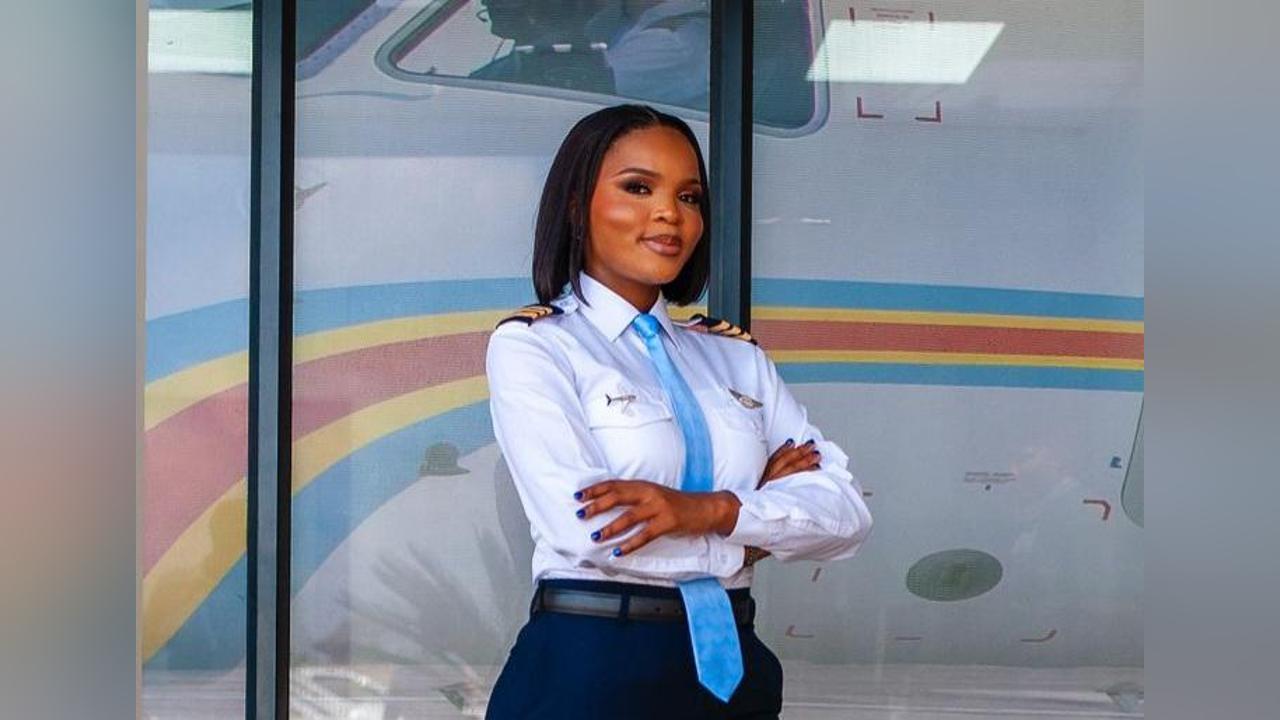Africa-Press – Eswatini. In an industry long dominated by men, Samkelisiwe Tembe has emerged as a beacon of hope, determination, and inspiration. As the first-ever female pilot for Eswatini Air, she is not only breaking gender barriers but also flying the Eswatini flag high, quite literally. In this heartfelt and honest interview, Tembe shares her incredible journey from the sugarcane fields of Lubulini to the cockpit of a commercial aircraft, offering a glimpse into the trials, triumphs, and tenacity that define her soaring success.
Interview with Samkelisiwe Tembe – Eswatini Air’s First Female Pilot.
1. Can you tell us a bit about where you grew up and your childhood?
I grew up in Lubulini in the Lubombo region, where I attended Lubulini Primary and Secondary Schools, then later completed high school at Ndzevane High. I lost my mother when I was just eight years old—she is the driving force behind who I am today, and I hope she’s proud wherever she rests. I’ve always been self-motivated and very independent. I was the first student in the history of Lubulini Secondary to achieve a merit pass, and I’ve always been a grounded child. My teachers recognized my potential even before I did.
2. What made you want to become a pilot?
Growing up surrounded by sugarcane fields, I often saw small planes spraying crops—and the sound of those aircraft always fascinated me. It became a dream, though it felt far-fetched at the time. After high school in 2012, I moved to town to stay with relatives while applying for university. I spent time at the USA Education Library at Sandla, where I had access to free internet. That’s when I started researching aviation courses. I also visited the Civil Aviation Authority and submitted application letters and personal statements, which they kept on file. In 2015, the State of Qatar offered aviation scholarships, and my application was selected. I was one of ten Swazis chosen. At the time, I was in my final year of a BSc in Agronomy at UNESWA, but I withdrew to pursue my true passion—flying.
3. Where did you train to become a pilot, and how was the experience?
I trained at Qatar Aeronautical College in Doha. The State of Qatar, known for Qatar Airways, places great importance on aviation, and the training environment was phenomenal. We had world-class instructors and flew modern training aircraft. The multicultural environment taught me a lot, and I remain deeply grateful to both the Kingdom of Eswatini and the State of Qatar for such an incredible opportunity.
4. What was the biggest challenge you faced during training?
Leaving home at just 20 years old was tough. I missed home, especially Swazi cuisine, and had to learn to be intentional with my studies. The passing grade was 80%, much higher than in typical tertiary institutions. I studied a lot, but it paid off—I became one of the top students in ground school. Despite the pressure to maintain a 100% pass rate, I adapted and excelled.
5. How does it feel to be the first female Liswati pilot at Eswatini Air?
It’s incredibly humbling. I think about all the people who supported me—within the organization, from HR to the accountable manager, to the captains I’ve flown with, and even members of the public. The support and recognition have been overwhelming, and I’m filled with gratitude. I hope to always do my best.
6. What message would you give to young girls who want to become pilots?
It’s absolutely possible. Every dream can come true. Believe in it, speak it into existence, and work hard for it. Hard work is essential to success. Aviation requires resilience, and it’s expensive to train in—but if you stay focused and give it your all, you can achieve it. I’m here because people believed in me, saw my passion, and recognized my work ethic. There’s nothing like the freedom of flying in the skies.
7. Did you face any challenges as a woman in aviation?
There are still stereotypes—some people don’t trust women to fly them. But from my experience, women pilots are among the best. We work harder and give our all. I choose to focus on the positive—the people who uplift and support me.
8. Who supported you on your journey to becoming a pilot?
So many people helped me along the way—it truly takes a village. From 2012 when I began visiting the Civil Aviation Authority, to the PA of the Director General who accepted my letters, to the Ministry of Transport, the Eswatini Civil Aviation Authority, and the Swazi Embassy in Qatar, who facilitated the scholarship. I’m incredibly thankful to the Government of Eswatini. My instructors in college, the entire Eswatini Air team who gave me a job as a flight dispatcher and later trained me to become a first officer—all played a role. I’ve had mentors and captains who flew with me and supported me. My family and the wider community also stood by me. I’m deeply grateful.
9. What are your future goals as a pilot?
I plan to continue gaining flight experience and eventually become a captain. I’m also passionate about academia and would love to further my studies—perhaps an MBA in aviation or a master’s in air transport. There’s always something new to learn in aviation. Beyond flying, I want to contribute to the growth of the aviation sector in Eswatini, raise awareness, and mentor young people interested in this field.
For More News And Analysis About Eswatini Follow Africa-Press







